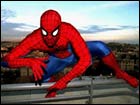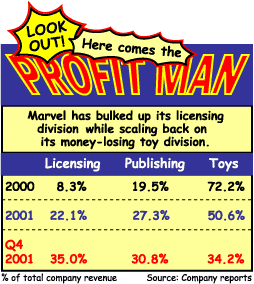
NEW YORK (CNN/Money) -
In comic books, superheroes often escape death at the last possible moment. The same might now be said for comic book publishers.
Marvel Enterprises, known for characters such as Spider-Man, Captain America and the X-Men, has undergone a stunning transition since its bankruptcy in 1996, most recently cashing in on Hollywood's new love affair with comic books.
Marvel (MVL: Research, Estimates) was one of the top performing stocks of the first quarter, with a 117.1 percent gain, mostly advance enthusiasm for the May 3 release of "Spider-Man: The Movie," starring the newly buff Tobey Maguire.
The company has a 50/50 joint venture with the film's producer, Sony, to share the merchandising revenues from Spider-Man movie products, such as t-shirts, video games and the requisite fast food tie-in (in this case with Hardee's). In addition, a company spokesperson says Marvel will participate in the box-office take but declined to say what percentage Marvel will receive.
The company has similar agreements in place for three movies set to be released in 2003. "Daredevil" stars Ben Affleck as the blind New York lawyer who uses, as Marvel describes it, "hyper-developed senses of hearing, smell and touch, and extraordinary acrobatic abilities" to fight crime.
"X-Men II" has Oscar winner Halle Berry reprising her role as the weather-controlling mutant Storm. And "The Incredible Hulk" is being directed by Ang Lee of "Crouching Tiger, Hidden Dragon" fame. (We're crossing our fingers for a Lou Ferrigno cameo.)
Hopes are so high for these movies that Marvel CEO Peter Cuneo said in the company's most recent earnings report that he expects the company to be profitable in 2002 and 2003 before one-time charges. Marvel reported a $27.5 million loss in 2001 (excluding a one-time gain) and an $89.9 million loss in 2000.
Introducing our villain, Ron Perelman
Profitability would be nothing short of miraculous for Marvel when you consider its recent past. The company's 1996 bankruptcy filing came after being saddled with loads of debt by its former owner, investor and Revlon chairman Ronald Perelman. Perelman bought Marvel in 1989 and went on a disastrous acquisition spree, scooping up trading card companies Fleer and Skybox as well as sticker company Panini. Each division has been since sold off.
But Perelman's biggest mistake might have been buying Heroes World, a small comic book distribution company. Perelman made it the only distributor of Marvel comics in the hopes of grabbing more profits by charging higher prices to retailers. But many small comic book store owners -- Marvel's core customers -- went out of business because they could no longer afford to buy the comics. Comic Book Guy from "The Simpsons" would probably say this was Perelman's Worst...Business Decision...Ever!
Ultimately, Marvel was able to emerge from bankruptcy in 1998 by merging with Toy Biz, a manufacturer that had the rights to make toys for Marvel characters. Toy Biz changed its name to Marvel Enterprises.
Licensing is big bucks
Although Marvel had found a white knight, the company still had many problems, the biggest being its reliance on toy manufacturing, a big money-loser.

Enter Hollywood. The success of the X-Men movie proved that comic-book franchises could be big hits. Cuneo, hired as CEO in 1999, decided to de-emphasize the toy business and focus more on licensing, which has been steadily profitable.
Marvel signed a five and a half year licensing agreement in July 2001 with an unaffiliated company called Toy Biz Worldwide, based in Hong Kong. Toy Biz Worldwide will make most of the Marvel character toys and action figures and Marvel will receive royalty fees.
Revenue from Marvel's toy division accounted for just 34 percent of total sales in the fourth quarter, down from 72 percent in 2000. Profitable licensing fees made up 35 percent of revenue, up from just 8 percent.
And even though overall revenues declined by 22.5 percent in the quarter, Marvel reported a profit of $3.4 million (excluding a one-time gain) in the quarter thanks to the more favorable business mix. In the fourth quarter of 2000, Marvel lost $53.4 million.
Not out of the woods yet
So is Marvel a good investment now? The company is on the right track but there are still several risks. For one, Marvel's balance sheet still needs some work. The company had $181.8 million in long-term debt as of the end of 2001. That's down from $250 million at the end of 2000. But Marvel only has $22.8 million in cash.
Also, there is no Wall Street coverage of the stock (and hence no earnings estimates) and very few mutual funds own the stock. The lack of estimates makes it tough to come up with a reasonable valuation for Marvel. For what it's worth, the company trades at about 1.5 times trailing sales.
And there are no public companies to compare Marvel to either. DC Comics, the second largest comic book publisher, is but a small part of AOL Time Warner, which also owns this web site. Stan Lee Media, the online comic book company founded by former Marvel chairman Stan Lee, filed for bankruptcy last year and shut down.
Finally, there's another issue worth mentioning. Due to the bankruptcy, Marvel has been forced to make sizable preferred dividend payments each quarter to shareholders who acquired preferred stock in 1998. The primary owner of these shares is Isaac Perlmutter, Marvel's vice chairman and the former owner of Toy Biz. This takes a chunk out of Marvel's bottom line. The quarterly profit Marvel had in the fourth quarter turns into a $710,000 loss once you factor in the $4.1 million preferred dividend payment.
All in all, Marvel is certainly in better shape now than it was a few years ago. But will the latest crop of comic book movies generate big box office numbers and huge merchandising sales? Will profits join the Hulk as big green things associated with Marvel? Stay tuned for the stock's next amazing adventure.

|

